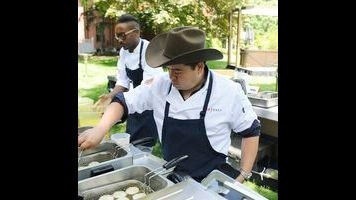Top Chef: “It’s War”

After four weeks of generally competent episodes that never rose the level of “fine,” Top Chef finally turned in an episode that was better than fine. It was, dare I say it, good. The episode seemed tailor-made to subvert a lot of the issues the season has had with lowered stakes thanks to the tweaks made to the judging process, as it had the competitors engage in head-to-head cook-offs in not just the Quickfire Challenge, but the Elimination Challenge, as well.
The episode opened with a chef I’ve never heard of, Jamie Bissonnette, a James Beard award winner with altogether too many consonants in his name, alongside Padma to introduce and judge the Quickfire Challenge. (A James Beard award is a cooking award given to good chefs who, upon accepting it, also receive a guest spot on a future episode of Top Chef, which may or may not be a fact I made up but find it far more interesting to pretend it’s canon.) Immediately the chefs are slightly jumpy as they’re informed that they’ll be competing one-on-one and able to choose their opponent, while their opponent chooses which dish (from a pre-established list) they’d be preparing. Up for grabs for the ultimate winner of the challenge is $10,000 courtesy of REYNOLDS KITCHEN PRODUCTS. In trade, the chefs must cook incorporating REYNOLDS KITCHEN PRODUCTS. In his kitchen, Chef Jamie Bissonnette (having that many double letters is just showing off, honestly) they often use REYNOLDS KITCHEN PRODUCTS when preparing their food in any number of ways. Doesn’t that make you want to run out and buy some REYNOLDS KITCHEN PRODUCTS today? Not me. I don’t even like foil.
The pairs are interesting, with Katsuji choosing to go head-to-head with Aaron and Mei and Gregory ending up squaring off by default proving the most interesting match-ups. Katsuji handily outpaces Aaron’s smoked salmon and Gregory upsets Mei’s steamed dumplings, before ultimately, again, winning the challenge, a result that’s starting to get pretty old. Doug, Keriann, and Katie also win their battles and end up on the blue team who will, together, yet still head-to-head, battle the red team in the Elimination Challenge to see which chefs would be subject to dismissal.
Before moving on to the specifics of the Elimination Challenge, let me take a moment to discuss how irritating I found certain elements of the Quickfire this week. Thanks to the mandatory useage of REYNOLDS KITCHEN PRODUCTS and the fact that two separate pre-selected dishes required smoking (smoked salmon and smoked BBQ) several of the chefs opted to attempt to cold smoke their protein. A fine choice, if cold smoking didn’t take 12 to 24 hours to be effective. I mean, congratulations on knowing how to cold smoke but F for effort for trying to pull it off in, literally, 30 minutes.
Since the show didn’t have faith that forcing the chefs to compete on a team while also going head-to-head was enough of a set-up for the Elimination Challenge, they also decided to arbitrarily build it around a Revolutionary War theme, with each match-up coinciding with a famous Revolutionary War battle. Not for any particular reason, mind you, just because. They did make the chefs serve outside at an old-timey location with a couple re-enactors wandering around but outside of Katsuji’s cowboy hat, the entire charade was an exercise in desperation. Also, since it was hard to make do during the days of the American Revolution, each team only has $1000 to split in order to prepare dishes for 100 guests.
Now that I think about it, that’s another bizarre aspect of the Elimination Challenge, further making it seem like a strange, cobbled together monstrosity. The teams prepare portions for 100 people and serve them but those people just wander around in the background and their opinion is of absolutely no consequence for the challenge itself. Was this really something that mattered? If one of the chefs or teams failed to produce 100 portions would they have been disqualified? Would it have been taken into consideration? Why even have them take on this extra element of obstacle if it really has no relevance in the end. They easily could have been sent into the world with $100 bucks per team to prepare five dishes for the judges and been just as challenged.
 Keep scrolling for more great stories.
Keep scrolling for more great stories.
